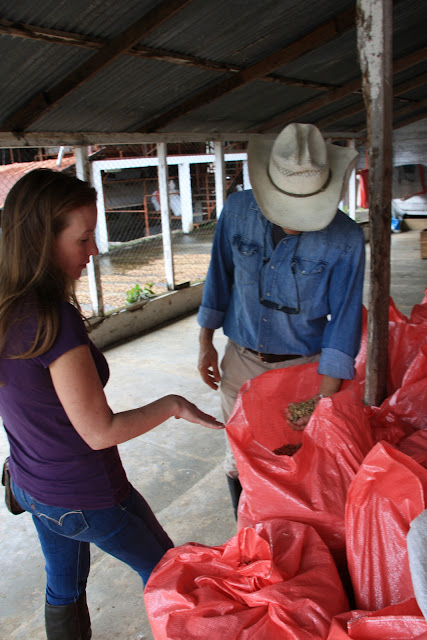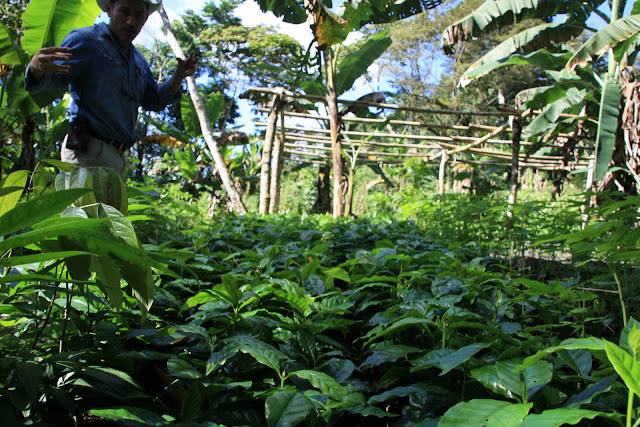Crossing borders by land is an adventure unto itself. Some are easy and some are not but they are all unique. At the crossing from Guatemala into Honduras we met a very energetic Belgium man and owner of
Cafe Via Via who offered us a free Cuba Libre if we stopped by his restaurant and said hello. We are not the type that would say no to free alcohol, so we stopped by and had a great dinner, drinks and conversation.
That night we learned about a very unique coffee tour in the rural mountains of Honduras at
Finca El Cisne. The full tour includes 3 home cooked meals, including fresh tilapia raised on the farm and a room at the guest house, a tour of the coffee, cacao and cardamon plantation and processing plant, a horseback ride through the finca and a relaxing soak in the hot springs for a mere $90 per person.
Carlos Castejon, our tour guide picked us up in Copan and took us on a treacherous 45 minute ride to his beautiful Finca El Cistine which has e owned by his family since 1885. We were fortunate to get a personal tour since we were the only people on the tour that day.
 |
| And they have a furry friendly mascot! |
Carlos took us to the 'cafe beneficio' or processing plant where the worker bring their freshly picked coffee berries to be prepared for sale. All coffee is picked by hand by local workers. Not all berries are ripe at the same time so workers have to be careful to pick only the ripe berries for the best quality of coffee. This means that each plant will be gleaned about 3-4 times in a season.
The workers bring the berries to the processing plant to be separated by floating. Placed into a large vat, the ripe berries will sink and the under/over ripe and insect contaminated will float. Then they are pulped (because coffee is really just the seed and not a bean.) Next the coffee is fermented for about 24 hours, and then dried either in the sun, or in a large dryer.
The best way to dry the green coffee beans is with good ole sunshine but it's the rainy season in this region of Honduras so sunshine can be scarce.
 |
| Workers spread the coffee out to dry on the patio. |
Carlos takes great pride in his coffee. He has high standards for how his coffee is processed to ensure the final product has the best possible flavor. Trust us, he has great coffee!
Since it is often overcast or rainy in this region they have large driers for the beans.
Green coffee beans once dried properly can be stored for much longer than roasted beans. Carlos sells his green coffee and also has some roasted.
 |
| So fluffy! |
Green coffee also weighs more than roasted coffee. This bag has been stored in a special green bag that lets the coffee outgas and stay fresh much longer.
Oh, this batch smells like chocolate!
 |
| Beautiful green coffee beans! |
Carlos has done an excellent job of diversifying his farm. As if coffee weren't good enough he also has cocoa, cardamon, tilapia, cattle and so much more.
 |
| Cacoa! |
 |
| Cocoa pods |
After the coffee plantation tour it is time for a horseback ride!
 |
| I'm on a horse!! |
First we have a quick crash coarse on how to ride since neither of us are experts.
Carlos and the horses took us to see his 'Cafe Vivero' or coffee nursery where he is raising hundreds of baby coffee plants. Since it takes several years for the coffee plant to have it's first harvest. It is a labor of love!
 |
| Sea of green! |
There have been several moments on our trip where we pinch ourselves and say "Look at where we are!" This was one of those moments.
 |
| No you are not having vertigo. |
This is the best we could do for a panorama but no photograph can fully take in the beauty of the Honduras country side. I guess you'll just have to go check out El Cisne yourself.
Be sure to tell Carlos we said hi!
 |
| Hey, I can see Guatemala from here! |








































































